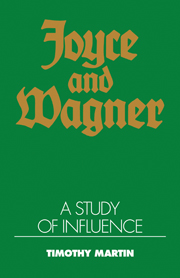3 - The Wandering Jew
Published online by Cambridge University Press: 05 November 2011
Summary
Frisch weht der Wind
der Heimat zu:
mein irisch Kind,
wo weilest du?
Wagner, Tristan und IsoldeJoyce's creative imagination remained in Ireland long after he left in 1904, and the problem of exile, of separation from home and family, was never absent from his writing. In Joyce's earlier works, particularly A Portrait and Exiles, separation is the result of artistic alienation and a necessary condition of artistic independence. We know that Stephen will defend his integrity with “silence, exile, and cunning” and that Richard Rowan will head for the Continent in his wake. In “Scylla and Charybdis” we learn that Shakespeare's major tragedies were written in absence from Stratford and in estrangement from his wife. Indeed, the case of Shakespeare illustrates the way in which the Joycean theme of exile begins to focus less exclusively on artistic alienation and to include a more general idea of separation – marital, social, political. “Proteus,” for example, devotes considerable attention not only to Stephen's recent sojourn in Paris but also to the political exile of the contemporary wild goose Kevin Egan: “They have forgotten Kevin Egan, not he them. Remembering thee, OSion” (U3.263–4; 44). Two figures in particular helped Joyce represent the cost of separation and the pain of estrangement: the wandering sailor – D. B. Murphy in “Eumaeus,” Odysseus throughout Ulysses, the Norwegian Captain in the Wake, to cite just a few examples – and the Wandering Jew. Both are embodied in Joyce's most celebrated character, Leopold Bloom.
- Type
- Chapter
- Information
- Joyce and WagnerA Study of Influence, pp. 54 - 77Publisher: Cambridge University PressPrint publication year: 1991



